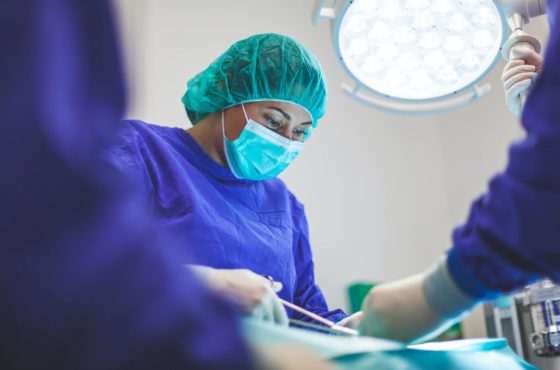Infection is just one of the side effects or complications that can occur from a defective hernia mesh used in a hernia repair surgery.
It can occur days after the surgery or even months after the procedure when your body has adverse reactions from the surgical mesh that was implanted.
Certain mesh products from manufacturers were also the subjects of hernia mesh lawsuit because of hernia mesh-related infections suffered by the plaintiffs.
You’re probably thinking of the answer to this question by now:
How do you know if you have an infected mesh?
Continue reading the article to learn more about the signs and symptoms of hernia mesh infection you should keep an eye out for.
Can Surgical Mesh Cause Infections?
The short answer? Yes.
Patients actually suffer from infection in the days or months following their hernia repair surgery.
In fact, according to an NIH study, infection occurs in 7% to 8% of patients after open incisional hernia repair while the infection rate for laparoscopic ventral and incisional hernia surgeries is 1% to 2%.
These infections from the surgical mesh can be minor or chronic.
Minor infections occur around the surgical site on the skin and can be treated with antibiotics.
However, deep, chronic mesh infection with hernia mesh can be harder to treat. In this case, patients might be in need of mesh removal surgery.
Signs of chronic infection such as inflammation, fever, and other flu-like symptoms may also develop only after a couple of years following hernia mesh surgery.
How do I know if my Hernia Mesh is Infected?
When a hernia mesh becomes infected, patients will usually have several symptoms which will tell them that something is wrong with the medical device they had implanted.
Some of the symptoms of hernia mesh-related infection are fever, inflammation, chronic pain, redness of skin, warmth at the incision site, improper healing, and flu-like symptoms.
If you happen to experience any of these symptoms, it is very important to seek medical attention right away.
Because these complications due to a hernia mesh often involves a corrective surgery, adequate medical treatment is necessary for the patient.
Symptoms of Hernia Mesh Infection
The following are the signs and symptoms you should look out for following a hernia repair surgery.
Fever
We often get a fever because our body is trying to kill off the virus or bacteria that caused an infection.
In this case, when a hernia mesh causes an infection, your body also reacts the same way. Your body temperature may also rise to kill off the bad bacteria causing the infection.
However, a patient should seek immediate medical attention if there is persistent fever above 100.4 F.
Inflammation
According to research, 1% to 8% of hernia repair surgeries lead to infection, with the increased risk being influenced by factors such as type of mesh used, patient comorbidities, the surgery technique, and more.
Many types of hernia mesh are made from polypropylene mesh, which is the most common type of synthetic hernia mesh.
Polypropylene mesh has been known to cause internal inflammation, although a certain degree of inflammation is expected as it is necessary to promote tissue growth so that the mesh can bond.
However, persistent or chronic inflammation may result in long-term abdominal pain and tenderness.
If the incision site of hernia surgery is tender, swollen, and if it feels warm to the touch, it is most likely a sign of infection.
Chronic Pain from Hernia Mesh Infection
Pain has been known as the most common sign of infection and other hernia mesh complications, including bowel perforation, bowel obstruction, mesh migration, abdominal pain, hernia mesh rejection, and hernia recurrence.
This pain often occurs at the site of the hernia, like the abdomen or the groin. If this pain is left untreated, it can cause chronic pain in patients which may lead to scar tissue and nerve damage.
The pain from infection, scar tissue, or nerve damage can make it difficult for a patient to perform daily routines or activities.
Redness at the Incision Site
Some redness is to be expected following a hernia repair surgery. However, if the incision site remains to be red or becomes red later on, it might be a sign of an infected mesh.
Depending on the severity of the hernia mesh infection, the reddish skin may also be tender to the touch.
Warmth at the Incision Site
The body generates heat at the presence of an infection.
This warmth may be felt at the incision site or the skin over where the hernia mesh was implanted.
If the area around your hernia mesh feels warm and you also experience other signs of infection, your mesh may be infected.
Lack of Healing
An infected mesh can prevent the surgical site from healing correctly, or it may also prevent the hernia itself from healing.
In some cases, patients may notice a seroma or a collection of fluid at the site of incision. This buildup of fluid can be tender, painful, and may prevent the tissue from healing.
Flu-Like Symptoms
An infection following hernia surgery may come with flu-like symptoms such as fever, chills, body aches, nausea, and vomiting.
These symptoms occur as our immune system’s response to the infection. Flu-like symptoms may also come with warmth and tenderness around the site of hernia repair, as well as pain and inflammation.
If you have these flu-like symptoms after you had a hernia repair surgery using mesh, seek immediate medical attention as your mesh may be infected.
Other Signs of Hernia Mesh Infection
Signs of mesh-related infection may also include:
- dental problems
- urinary tract infections
- diarrhea
- pneumonia
- wound drainage
- fistula (an abnormal connection between organs)
Hernia Repair
A hernia is an extremely common medical problem that affects men, women, and even children.
Hernias occur when an organ or tissue protrudes through a weak place in the surrounding tissue of the abdominal wall.
Hernia repair is one common but major surgery used to fix hernias.
Surgeons begin hernia repairs by making a cut or incision to open your skin. The surgeon then gently puts the organ back to its appropriate place and sews the hernia mesh over the weakened area in order to strengthen it.
There are different types of hernias, depending on the affected body part of a patient, but the most common type of hernia is the inguinal hernia.
An inguinal hernia occurs when organs protrude through a weak spot in the abdominal muscles and into the groin.
The use of hernia mesh has been considered the most common form of treatment that every year, more than 100,000 of these medical devices are used for hernia surgeries in the United States alone.
Hernia surgery, however, also comes with significant risks and myriad complications.
Studies have found that hernia mesh medical devices are linked to a high failure rate, which led to thousands of plaintiffs filing a hernia mesh lawsuit in order to seek justice for the complications they have suffered due to the medical device.
Hernia mesh complications include adhesion, bowel obstruction or perforation, hernia mesh infection, mesh migration, and rejection.
After mesh repair surgery, patients have also reported symptoms of mesh failure, pain, and hernia recurrence.
What are the Symptoms of Hernia Mesh Rejection?
Since a hernia mesh is not a natural part of our body, there’s a chance that the immune system may consider it as a foreign object and begin to attack the hernia mesh as well as the surrounding tissue to protect our body.
But when this response goes out of hand, it can result in a chain reaction which can later on lead to a myriad of serious complications, including the body rejecting the hernia mesh.
And when your body rejects the device, you will experience symptoms that will indicate that your body is not tolerating the hernia mesh implant.
Symptoms of hernia mesh rejection include:
- chills
- pain or discomfort
- high fever
- mild to severe swelling at the site of hernia repair surgery
- nausea or vomiting
- difficulty passing gas or stool
- redness of the skin
- difficulty urinating
- abdominal stiffness
- tenderness
- other flu-like symptoms
Aside from these signs of rejection, patients can also suffer from severe pain and other dental problems due to hernia mesh infections.
If you had hernia surgery and you begin to experience the symptoms mentioned above after your procedure, then your body may be rejecting the hernia mesh.
In this case, patients may need another surgery for mesh removal or revision of the repair.
Patients should also seek immediate medical attention if they experience signs of hernia mesh rejection.
How is a Hernia Mesh Infection Treated?
A variety of imaging techniques may help the doctor determine if mesh infections due to the implanted device is indeed present. A CT scan or ultrasound may be ordered by your doctor to be sure.
Once the patient is diagnosed with a hernia mesh-related infection, medical and surgical treatment may take place. These two would include antibiotics, intravenous antimicrobial agents, and/or surgery for mesh removal.
However, according to a 2018 NIH study, these kinds of treatment involving antibiotics, surgical drainage, and antimicrobial agents were found to have limited success in hernia mesh salvage.
Mesh infections often require mesh explantation and an abdominal wall reconstruction after the removal of the device, the study added.
According to another study, 63% of patients with hernia mesh-related infections are infected with the MRSA (methicillin-resistant bacteria), which is extremely hard to provide treatment to.



